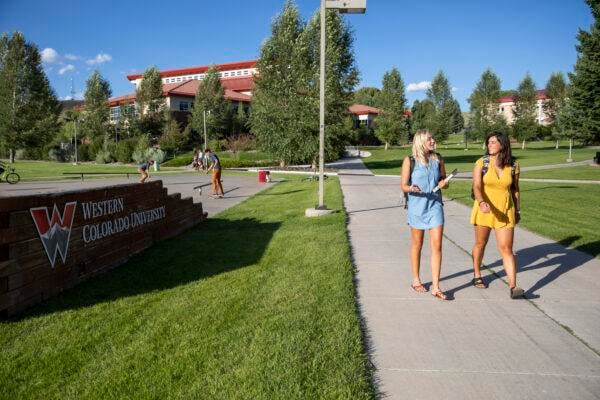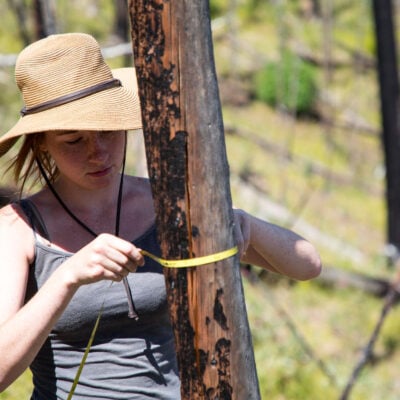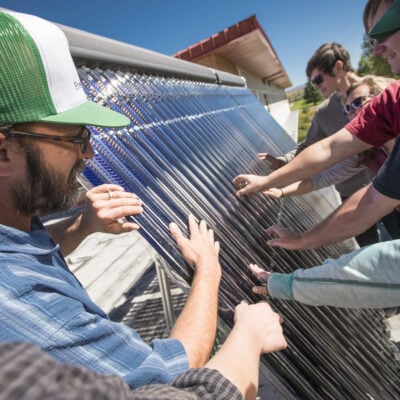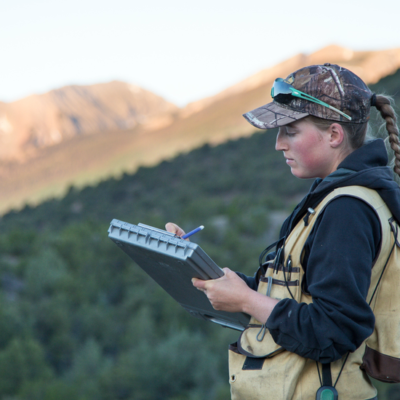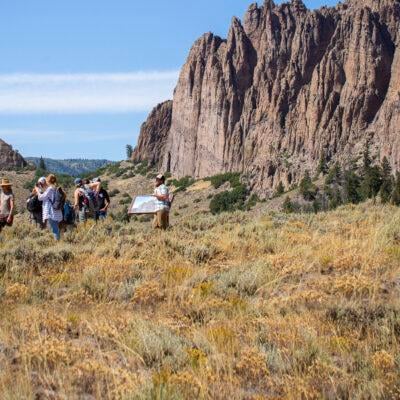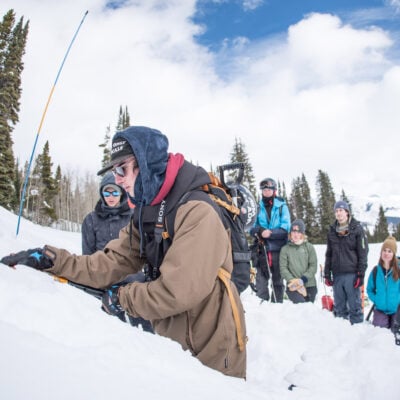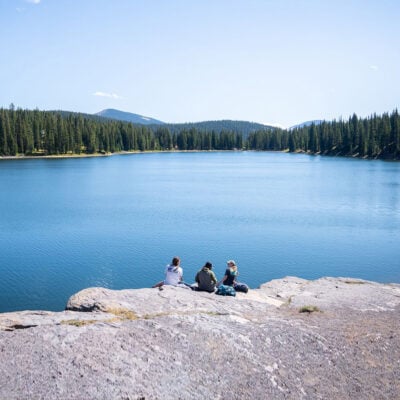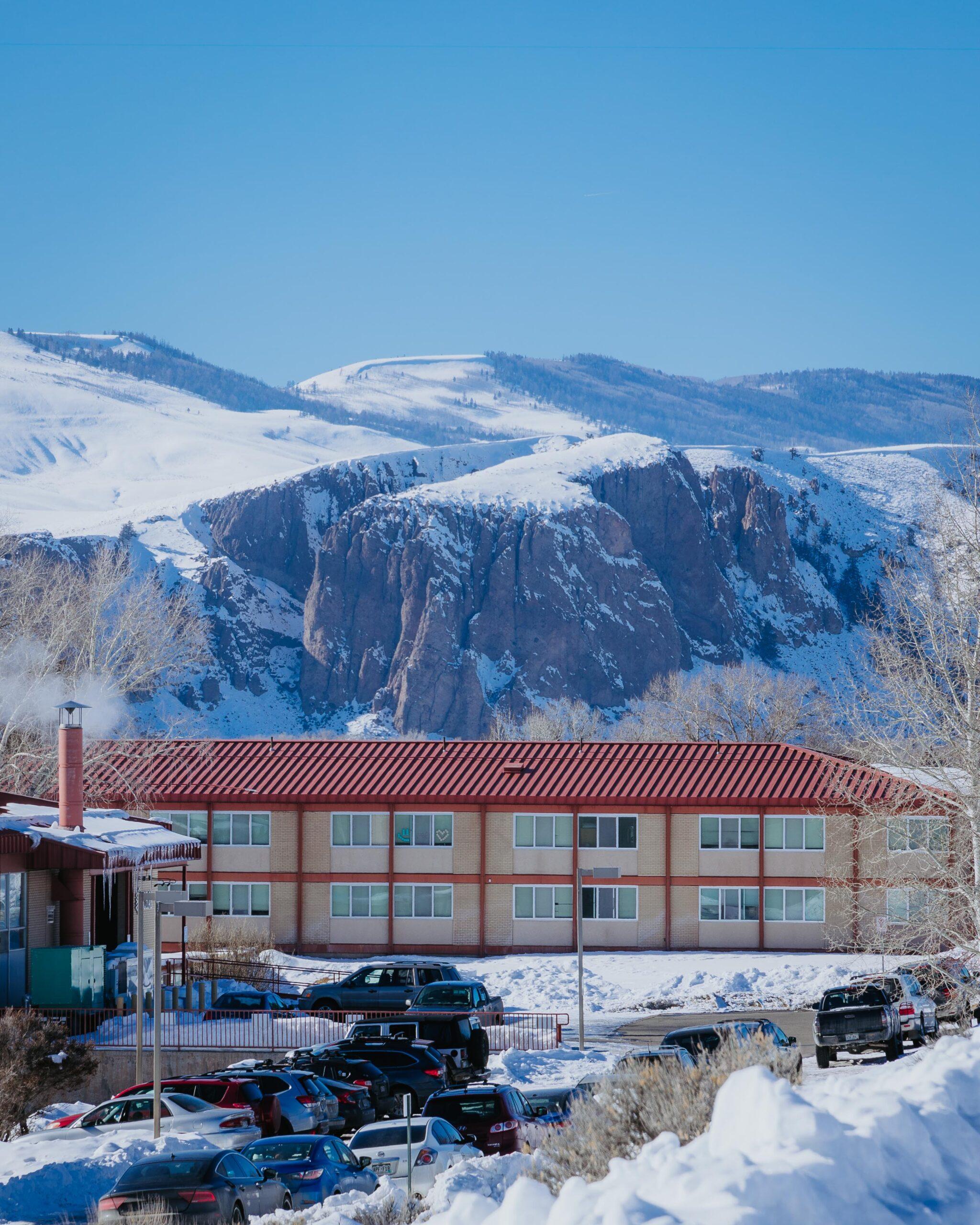As the impacts of climate change are realized more each year, it becomes increasingly necessary to have ambitious, hopeful, and innovative professionals dedicated to helping mitigate these changes through current and future plans of action. Though climate change and its effects can seem overwhelming, the Climate Action Planning emphasis will equip you with the research, resources and policy development tactics you need to professionally guide both current and future generations toward a sustainable and healthy planet.
Program Overview

Advocate for a sustainable future locally, nationally and globally.
Through a dedication to sustainability and a commitment to positive change, the innovative and impactful Climate Action Planning emphasis teaches you how implement tactics to reduce climate change and its effects both now and in the future. In this program, you’ll start by building a comprehensive foundation of environment and sustainability principles from ecological and political perspectives. You’ll then apply this knowledge to understand the implications of climate change on both major and minor scales, learn how to create and implement policies, advocate for change, and help work toward environmental resilience.
Learn from experience
Through this emphasis, you’ll combine academic research with a variety of field practices to give you both a theoretical and practical understanding of how to implement policies for effective climate action.
Program Requirements
At Western, course rotations are crafted to encompass a variety of subject fields for a comprehensive education and versatile degree. For required courses and degree plans, visit the official University Catalog. Below is a general overview of courses at Western Colorado University related to this area of study.
Program Requirements
The Climate Action Planning emphasis will provide the essential tools for climate planning which include assessing vulnerability to climate change and preparing for the future. The emphasis prepares students to identify and prioritize specific implementation steps in the electricity, transportation, land use, and waste management sectors. This includes an understanding of policies designed to mitigate climate change or help communities adapt, as well as quantitative approaches to measuring vulnerability and evaluating various paths forward.
A minimum of 61 credits is required for the Environment & Sustainability Comprehensive Major: Climate Action Planning Emphasis.
| Code | Title | Credits |
|---|---|---|
| BUAD 305 | Applied Energy Seminar | 3 |
| ENVS 100 | Introduction to Environment and Sustainability (GT-SS2) | 3 |
| ENVS 200 | Writing the Environment | 3 |
| ENVS 210 | Introduction to Climate Policy | 3 |
| ENVS 250 | Environmental Justice | 3 |
| ENVS 301 | Science of Sustainability and Resilience | 3 |
| ENVS 320 | Quantitative Skills for Climate Action Planning | 3 |
| ENVS 350 | U.S. and Western Environmental Politics | 3 |
| ENVS 380 | Advanced Climate Policy | 3 |
| ENVS 390 | Environmental Monitoring | 4 |
| ENVS 400 | Applied Sustainability | 3 |
| ENVS 410 | Environmental Ethics | 3 |
| ENVS 435 | Environmental Grant Writing | 1 |
| ENVS 440 | Climate Action Planning | 3 |
| ENVS 499 | Internship in Environmental Studies | 3 |
| Required Supporting Courses | ||
| BIOL 130 | Environmental Biology (GT-SC2) | 3 |
| BIOL 135 | Environmental Biology Laboratory (GT-SC1) | 1 |
| ECON 215 | Environmental Economics | 3 |
| PHYS 125 | Energy and the Environment (GT-SC2) | 3 |
| Select one of the following: | 1 | |
HWTR 200 | This Is The Headwaters | |
HWTR 398 | Headwaters Conference | |
| Select one of the following: | 3 | |
ECON 216 | Statistics for Business and Economics | |
MATH 113 | Statistical Thinking (GT-MA1) | |
MATH 213 | Probability and Statistics (GT-MA1) | |
SOC 211 | Quantitative Research Methods | |
| Select one of the following: | 3 | |
ANTH 230 | Cultural Anthropology (with laboratory) | |
ANTH 320 | Cultural Ecology | |
ENG 151 | Borderlands: Representing Race, Class, Gender, and Sexuality | |
POLS 250 | Politics of the Environment | |
POLS 340 | Politics of Social Movements | |
POLS 350 | Human Rights | |
POLS 355 | The Global South | |
POLS 370 | Political Economy | |
PSY 308 | Environmental Psychology | |
PSY 410 | Multicultural Psychology | |
PSY 457 | Social Psychology | |
SOC 150 | Environmental Sociology | |
SOC 168 | Social Problems | |
SOC 340 | Social Movements | |
SOC 380 | Social Inequalities | |
| Total Credits | 61 | |
Capstone Course Requirement
The following course in the Environment and Sustainability Major fulfills the capstone course requirement: ENVS 400 Applied Sustainability.
Graduation Requirements
Undergraduate programs require a minimum of 120 semester credits for graduation. Of those 120 credits, 40 credits must be in upper-division courses (those marked 300 and above). Fifteen of these 40 upper-division credits must be earned in courses that are part of the standard or comprehensive major program being pursued.
Students are expected to review all graduation requirements, which can be found in the Western Undergraduate Catalog: Graduation Requirements.
Degree Plan
| Year One | ||
|---|---|---|
| Fall | Credits | |
| HWTR 100 | First Year Seminar | 1 |
| ENVS 100 | Introduction to Environment and Sustainability (GT-SS2) | 3 |
| BIOL 130 | Environmental Biology (GT-SC2) | 3 |
| BIOL 135 | Environmental Biology Laboratory (GT-SC1) | 1 |
| ENG 102 | Writing and Rhetoric I (GT-CO1) | 3 |
| Gen Ed | General Education (Area I, II, or III) | 3 |
| Credits | 14 | |
| Spring | ||
| MATH 113 | Statistical Thinking (GT-MA1) | 3 |
| Elective | Elective | 3 |
| PHYS 125 | Energy and the Environment (GT-SC2) | 3 |
| ENG 103 | Writing and Rhetoric II (GT-CO2) | 3 |
| Gen Ed | General Education (Area I, II, or III) | 3 |
| Credits | 15 | |
| Year Two | ||
| Fall | ||
| HWTR 398 | Headwaters Conference | 1 |
| ENVS 200 | Writing the Environment | 3 |
| Gen Ed | General Education (Area II) | 3 |
| Gen Ed | General Education (Area I or III) | 3 |
| Elective | Elective or minor course | 3 |
| ENVS 250 | Environmental Justice | 3 |
| Credits | 16 | |
| Spring | ||
| ECON 215 | Environmental Economics | 3 |
| Gen Ed | General Education (Area I or III) | 3 |
| Gen Ed | General Education (Area I or III) | 3 |
| ENVS 210 | Introduction to Climate Policy | 3 |
| Elective | Elective or minor course | 3 |
| Credits | 15 | |
| Year Three | ||
| Fall | ||
| BUAD 305 | Applied Energy Seminar | 3 |
| ENVS 301 | Science of Sustainability and Resilience | 3 |
| ENVS 350 | U.S. and Western Environmental Politics | 3 |
| Elective | chosen from selection of classes on racial, gender, sex, and/or class contexts | 3 |
| Elective | Elective | 3 |
| Credits | 15 | |
| Spring | ||
| ENVS 360 or ENVS 370 or ENVS 373 |
Global Environmental Policy or Water Policy and Politics or The Water Planet |
3 |
| ENVS 320 | Quantitative Skills for Climate Action Planning | 3 |
| ENVS 390 | Environmental Monitoring | 4 |
| Elective | Elective or minor course | 3 |
| Elective | Elective | 3 |
| Credits | 16 | |
| Summer | ||
| ENVS 499 | Internship in Environmental Studies (Recommended but optional) | 3 |
| Credits | 3 | |
| Year Four | ||
| Fall | ||
| ENVS 380 | Advanced Climate Policy | 3 |
| ENVS 435 | Environmental Grant Writing | 1 |
| Elective | Elective or minor course | 4 |
| Elective | Elective or minor course | 3 |
| ENVS 410 | Environmental Ethics | 3 |
| Credits | 14 | |
| Spring | ||
| ENVS 499 | Internship in Environmental Studies (if not taken over summer) | 3 |
| Elective | Elective or minor course | 3 |
| Elective | Elective or minor course | 3 |
| ENVS 430 | Watersheds of the World | 3 |
| ENVS 400 | Applied Sustainability | 3 |
| Credits | 15 | |
| Total Credits | 123 | |
Careers
Take the first steps toward your dream career.
Career preparation is the primary focus of every academic program at Western. Our professors and Office of Career Services will help you identify your strengths, hone your skills, define your goals, and prepare for a fulfilling role in hundreds of professional fields after graduation.
The data is automatically collected by Lightcast, a firm that sources job market data. The statistics illustrate general trends in U.S. careers, but do not precisely represent every job and salary.
Scholarships
Western’s Scholarship Application portal allows you to search for, apply to and manage your scholarship opportunities. This platform houses over 300+ departmental and privately funded scholarship opportunities available to both new and returning students. Through the scholarship portal, students may identify scholarship opportunities based on academic program, campus involvement, academic standing, specific keywords and more. Students may click below to begin learning about what scholarship opportunities are available to them.
Please check individual scholarship opportunity start dates and deadlines as there are exceptions.
Find your scholarships!Western’s Scholarship Application portal allows you to search for, apply to and manage your scholarship opportunities. This platform houses over 300+ departmental and privately funded scholarship opportunities available to both new and returning students. Through the scholarship portal, students may identify scholarship opportunities based on academic program, campus involvement, academic standing, specific keywords and more. Students may click below to begin learning about what scholarship opportunities are available to them.
Please check individual scholarship opportunity start dates and deadlines as there are exceptions.
Find your scholarships!Alumni Association Future Alumni Scholarship
The Alumni Association Scholarship is a one-time scholarship of $1,000 and is applicable for the student’s junior or senior year at Western.
Any child or grandchild of an alumni is eligible to receive the Future Alumni Scholarship.
- This is a one-time non-renewable scholarship of $1,000.
- Only one Future Alumni Scholarship will be awarded per academic year.
- GPA must be 3.2 or above (college).
Due date has been extended to April 30 for 2024. An Alumni selection committee, appointed by the Alumni Advisory Council, will review applicants and select awardee by June 1.
Alumni Legacy Scholarship
The Alumni Legacy Scholarship is a one-time non-renewable scholarship and is only applicable for the student’s first year at Western (incoming freshman or new transfer students are eligible).
Do you have a son or daughter looking at college? Have they considered attending Western? As an alumni, your son, daughter and/or grandchildren are eligible for certain benefits distributed through this scholarship, as follows:
- This is a one-time scholarship of $1,000.
- Nominee must be an incoming first-year student or new transfer.
- The cost of orientation is reduced by half (a $45 value).
- The admission application fee is waived (a $30 value).
- GPA must be 2.5 or above (high school or college of transfer).
The applicant must fill out the application form found below. Application forms are accepted year-round. If the applicant meets the GPA guidelines, the scholarship will be awarded.
Mountaineer Alumni Recommendation Scholarship
The Mountaineer Alumni Recommendation Scholarship is a one-time non-renewable scholarship and is only applicable for the student’s first year at Western. This scholarship is not available to midyear transfers or students beginning in the spring semester.
Are you an alumni or employee of Western and know a prospective (or incoming) student who would be a great fit at Western? A recommendation from alumni and employees can support any new student and provide them a $500 scholarship their first year. (Western employees may not recommend a spouse or dependent receiving tuition benefits).
- Any Western alumni/employee may nominate only one student per academic year to receive the $500 scholarship (distributed $250 per semester).
- The scholarship is good for the first year only and is non-renewable.
- The recommended student must be a full-time undergraduate student, attending Western for the first time.
The applicant must fill out the application form found here. The nominating alumni/employee must fill out the application form and submit the required documents by June 1. The recommended student must meet university admissions acceptance standards and complete the Free Application for Federal Student Aid (FAFSA).
The Presidential Promise is guaranteed to students who have received a scholarship through the Denver Scholarship Foundation (DSF) and/or GearUp—and are eligible for a Pell Grant.
For students who meet these criteria, Western will cover the cost of tuition and fees through the combination of federal, state and institutional aid. For more information on the Presidential Promise, visit our scholarships page.
Western Undergraduate Exchange (WUE) or Central Plains (CP) tuition represents a substantial savings relative to normal, out-of-state tuition. Students eligible for the WUE or CP program will be charged 150% of Western’s total in-state tuition. For 2018-19, total in-state tuition was $8,934. WUE/CP tuition was $13,401. The WUE/CP discount is valued at $4,695.
For more information about the WUE and CP geography-based programs, visit Western’s Tuition Discount Programs Page.
Immediately upon acceptance at Western, every student is considered for a merit scholarship worth between $2,500-$4,500 per year for in-state students and $8,000-$10,000 for out-of-state students. The amount is based on the student’s GPA and ACT/SAT scores. Visit our Net Price Calculator at western.edu/cost to determine whether you qualify for a merit scholarship.
For more information about merit scholarships at Western, visit our scholarships page.
Get Involved

Apply your education to the real world.
Get hands-on experience, create lasting connections, enhance your knowledge, and prepare yourself for a fulfilling career aimed toward restoring the planet.
- Clubs & Organizations: Join the Organics Guild, Western Solar Society, Equitable Solar Solutions, Sustainability Coalition, or the Wildlife Society.
- Coldharbour Institute: Experiment with sustainable building design, resilient food systems, or community organizing in the Gunnison Valley.
- Conferences: Attend the Headwaters Conference, the Colorado Water Workshop, and Sage Grouse Spring Symposium.
- Earthship Academy: Learn how to construct a self-sustaining building capable of producing food and saving energy.
- High Country News: Check out the independent news source’s new satellite office located in Kelley Hall.
- Rocky Mountain Biological Laboratory: Find a research assistantship at one of the premier biological research stations in the world.
- Solar Energy International: Engage in the local, regional, or global conversation about the renewable energy era.
A lasting impact
The Climate Action Planning emphasis prepares you to take on a variety of professional roles that will help you make a long-lasting, positive impact on individual communities as well as the planet as a whole.
News & Research
Department Information
Clark Family School of Environment and Sustainability
Dean
Micah Russell, M.S.Assistant Professor of Environment and Sustainability, Integrative and Public Land Management Director; MEM Director
Program Facilitator
Lindsay DolezalProgram Facilitator and Grants Administrator
Campus Location
1 Western Way
Gunnison, CO 81230

